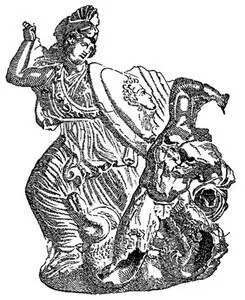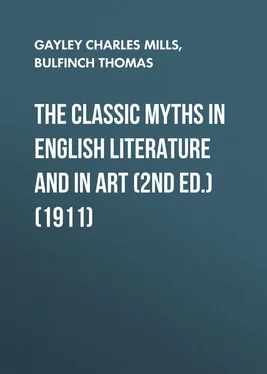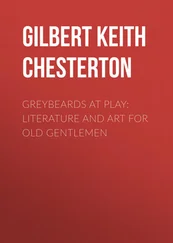Thomas Bulfinch - The Classic Myths in English Literature and in Art (2nd ed.) (1911)
Здесь есть возможность читать онлайн «Thomas Bulfinch - The Classic Myths in English Literature and in Art (2nd ed.) (1911)» — ознакомительный отрывок электронной книги совершенно бесплатно, а после прочтения отрывка купить полную версию. В некоторых случаях можно слушать аудио, скачать через торрент в формате fb2 и присутствует краткое содержание. Жанр: foreign_antique, foreign_prose, на английском языке. Описание произведения, (предисловие) а так же отзывы посетителей доступны на портале библиотеки ЛибКат.
- Название:The Classic Myths in English Literature and in Art (2nd ed.) (1911)
- Автор:
- Жанр:
- Год:неизвестен
- ISBN:нет данных
- Рейтинг книги:4 / 5. Голосов: 1
-
Избранное:Добавить в избранное
- Отзывы:
-
Ваша оценка:
- 80
- 1
- 2
- 3
- 4
- 5
The Classic Myths in English Literature and in Art (2nd ed.) (1911): краткое содержание, описание и аннотация
Предлагаем к чтению аннотацию, описание, краткое содержание или предисловие (зависит от того, что написал сам автор книги «The Classic Myths in English Literature and in Art (2nd ed.) (1911)»). Если вы не нашли необходимую информацию о книге — напишите в комментариях, мы постараемся отыскать её.
The Classic Myths in English Literature and in Art (2nd ed.) (1911) — читать онлайн ознакомительный отрывок
Ниже представлен текст книги, разбитый по страницам. Система сохранения места последней прочитанной страницы, позволяет с удобством читать онлайн бесплатно книгу «The Classic Myths in English Literature and in Art (2nd ed.) (1911)», без необходимости каждый раз заново искать на чём Вы остановились. Поставьте закладку, и сможете в любой момент перейти на страницу, на которой закончили чтение.
Интервал:
Закладка:
4. Origin of the Gods.So far we have a history of the throes and changes of the physical world; now begins the history of gods and of men. For in the heart of creation Love begins to stir, making of material things creatures male and female, and bringing them together by instinctive affinity. First Erebus and Night, the children of Chaos, are wedded, and from them spring Light and Day; then Uranus , the personified Heaven, takes Gæa , the Earth, to wife, and from their union issue Titans and hundred-handed monsters and Cyclopes.
The Titans 4 4 On the Titans, etc., Preller's Griech. Mythol. 1, 37.
appear to be the personification of mighty convulsions of the physical world, of volcanic eruptions and earthquakes. They played a quarrelsome part in mythical history; they were instigators of hatred and strife. Homer mentions specially two of them, Iapetus and Cronus; but Hesiod enumerates thirteen. Of these, the more important are Oceanus and Tethys, Hyperion and Thea, Cronus and Rhea, Iapetus, Themis, and Mnemosyne. The three Cyclopes represented the terrors of rolling thunder, of the lightning-flash, and of the thunderbolt; and, probably, for this reason, one fiery eye was deemed enough for each. The hundred-handed monsters, or Hecatonchires , were also three in number. In them, probably, the Greeks imaged the sea with its multitudinous waves, its roar, and its breakers that seem to shake the earth. These lightning-eyed, these hundred-handed monsters, their father Uranus feared, and attempted to destroy by thrusting them into Tartarus, the profound abysm of the earth. Whereupon Mother Earth, or Gæa, indignant, called for help upon her elder children, the Titans. None dared espouse her cause save Cronus, the crafty. With an iron sickle he lay in wait for his sire, fell upon him, and drove him, grievously wounded, from the encounter. From the blood of the mutilated Uranus leaped into being the Furies, whose heads writhe with serpents; the Giants, a novel race of monsters; and the Melic Nymphs, invidious maidens of the ashen spear.
5. The Rule of Cronus.Now follows the reign of Cronus, lord of Heaven and Earth. He is, from the beginning, of incalculable years. In works of art his head is veiled, to typify his cunning and his reserve; he bears the sickle not only as memento of the means by which he brought his father's tyranny to end, but as symbol of the new period of growth and golden harvests that he ushered in.
For unknown ages Cronus and Rhea, his sister-queen, governed Heaven and Earth. To them were born three daughters, Vesta, Ceres, and Juno, and three sons, Pluto, Neptune, and Jupiter. Cronus, however, having learned from his parents that he should be dethroned by one of his own children, conceived the well-intentioned but ill-considered device of swallowing each as it was born. His queen, naturally desirous of discouraging the practice, – when it came to the turn of her sixth child, palmed off on the insatiable Cronus a stone carefully enveloped in swaddling clothes. Jupiter (or Zeus), the rescued infant, was concealed in the island of Crete, where, nurtured by the nymphs Adrastea and Ida, and fed on the milk of the goat Amalthea, he in due season attained maturity. Then, assisted by his grandmother Gæa, he constrained Cronus to disgorge the burden of his cannibal repasts. First came to light the memorable stone, which was placed in safe keeping at Delphi; then the five brothers and sisters of Jupiter, ardent to avenge themselves upon the unnatural author of their existence and their captivity.
6. The War of the Titans.In the war which ensued Iapetus and all the Titans, except Oceanus, ranged themselves on the side of their brother Cronus against Jupiter and his recently recovered kinsfolk. Jupiter and his hosts held Mount Olympus. For ages victory wavered in the balance. Finally Jupiter, acting again under the advice of Gæa, released from Tartarus, where Uranus had confined them, the Cyclopes and the Hecatonchires. Instantly they hastened to the battle-field of Thessaly, the Cyclopes to support Jupiter with their thunders and lightnings, the hundred-handed monsters with the shock of the earthquake. Provided with such artillery, shaking earth and sea, Jupiter issued to the onslaught. With the gleam of the lightning the Titans were blinded, by the earthquake they were laid low, with the flames they were well-nigh consumed: overpowered and fettered by the hands of the Hecatonchires, they were consigned to the yawning cave of Tartarus. Atlas, the son of Iapetus, was doomed to bear the heavens on his shoulders. But a more famous son of the same Titan, Prometheus, who had espoused the cause of Jove, acquired dignity hereafter to be set forth.
7. The Division of Empire.In the council of the gods that succeeded, Jupiter was chosen Sovereign of the World. He delegated to his brother Neptune (or Poseidon) the kingdom of the sea and of all the waters; to his brother Pluto (or Hades), the government of the underworld, dark, unseen, mysterious, where the spirits of the dead should dwell, and of Tartarus, wherein were held the fallen Titans. For himself Jupiter retained Earth and the Heaven, into whose broad and sunny regions towered Olympus, the favored mountain of the greater gods. 5 5 On signification of Uranus, Cronus, Zeus, see Preller, 1, 37, 38, and Commentary, §§ 4, 24.
8. The Reign of Jupiter.New conflicts, however, awaited this new dynasty of Heaven – conflicts, the subject of many a tale among the ancients. Gæa, though she had aided her grandson Jupiter in the war against Cronus, was soon seized with compunctions of conscience; and contemplating the cruel fate of her sons the Titans, she conceived schemes of vengeance upon their conqueror. Another son was born to her — Typhon , a monster more awful than his predecessors – whose destiny it was to dispute the sway of the almighty Zeus. From the neck of Typhon dispread themselves a hundred dragon-heads; his eyes shot fire, and from his black-tongued chaps proceeded the hissing of snakes, the bellowing of bulls, the roaring of lions, the barking of dogs, pipings and screams, and, at times, the voice and utterance of the gods themselves. Against Heaven this horror lifted himself; but quailing before the thunderbolt of Jove, he too descended to Tartarus, his own place and the abode of his brethren. To this day, however, he grumbles and hisses, thrusts upward a fiery tongue through the crater of a volcano, or, breathing siroccos, scorches trees and men.

Fig. 2. Athena and Giant
Later still, the Giants , offspring of the blood that fell from the wounded Uranus, renewed the revolt against the Olympian gods. They were creatures nearer akin to men than were the Titans, or the Cyclopes, or Typhon. They clothed themselves in the skins of beasts, and armed themselves with rocks and trunks of trees. Their bodies and lower limbs were of snakes. They were awful to encounter or to look upon. They were named, like men, the earthborn ; and their characteristics would suggest some prehistoric brutish race, hotheaded, not amenable to reason. 6 6 Roscher, Ausf. Lex., Article Giganten [J. Ilberg].
Of the Giants, the more mighty were Alcyoneus of the winter storms and icebergs, Pallas, and Enceladus, and Porphyrion the fire-king, – leader of the crew. In the war against them, Juno and Minerva, divinities of the new dynasty of Heaven, took active part, – and Hercules, an earthly son of Jupiter, whose arrows aided in their defeat. It was from the overthrow of Pallas that Athena (or Minerva) derived, according to certain records, her proud designation of Pallas-Athena. 7 7 The name more probably signifies Brandisher [of the Lance].
In due course, like the Titans and Typhon, the Giants were buried in the abyss of eternal darkness. What other outcome can be expected when mere physical or brute force joins issue with the enlightened and embattled hosts of heaven?
Интервал:
Закладка:
Похожие книги на «The Classic Myths in English Literature and in Art (2nd ed.) (1911)»
Представляем Вашему вниманию похожие книги на «The Classic Myths in English Literature and in Art (2nd ed.) (1911)» списком для выбора. Мы отобрали схожую по названию и смыслу литературу в надежде предоставить читателям больше вариантов отыскать новые, интересные, ещё непрочитанные произведения.
Обсуждение, отзывы о книге «The Classic Myths in English Literature and in Art (2nd ed.) (1911)» и просто собственные мнения читателей. Оставьте ваши комментарии, напишите, что Вы думаете о произведении, его смысле или главных героях. Укажите что конкретно понравилось, а что нет, и почему Вы так считаете.












